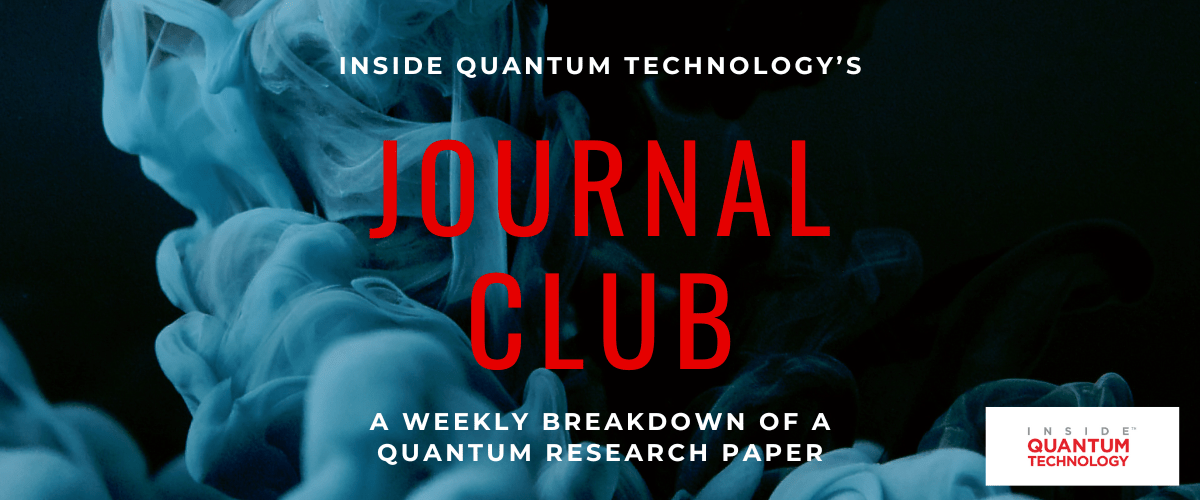
IQT’s “Journal Club” is a weekly article series that breaks down a recent quantum technology research paper and discusses its impacts on the quantum ecosystem.
The realm of quantum computing often sounds like it’s ripped straight from the pages of science fiction, but it’s very real and evolving rapidly. In a new Nature Scientific Reports paper, researchers at IBM Quantum and Thomas J. Watson Research Center are now focusing on a new aspect called “Quantum Reservoir Computing.” To understand this, imagine a vast reservoir of water where waves can be used to predict what will happen next – only, in this case, the water is the quantum state of particles, and the waves are data.
Quantum Reservoir Computing is an exciting advancement in the field of quantum machine learning, particularly suited for predicting sequences and patterns over time, much like forecasting weather patterns or stock market trends. Traditional computers struggle with these tasks because they are linear and orderly, but the natural world – like the stock market or weather – is complex and often chaotic.
What’s truly innovative about the latest developments is using “noise” within the quantum system. In everyday life, noise is usually something we try to reduce or eliminate. In the quantum world, however, this noise can be harnessed and controlled to help make better predictions. It’s as if the static on your radio could suddenly tell you what song will play next.
Scientists have devised a way to tune this quantum noise, adjusting it to improve predictions. This is done by programming the noise into the quantum circuits – the pathways that control quantum bits, or qubits, which are the basic information units in quantum computing. By fine-tuning the noise, the IBM Quantum researchers could optimize the performance of the quantum system.
Moreover, the researchers have found ways to simplify these quantum systems. They’ve reduced the number of qubits needed and the complexity of their connections (entanglement), making the systems easier to manage and potentially more robust.
The impact of these quantum reservoir computing advancements is already showing promise. Using a single noise model and a smaller memory, scientists have achieved impressive results in simulating complex systems. One example given is the Mackey-Glass system, which is a mathematical model used to describe complex systems such as biological oscillations. The researchers were able to predict its behavior 100 steps ahead in what’s known as the chaotic regime – a significant challenge due to the system’s unpredictable nature.
In layman’s terms, this is akin to looking into a very complicated crystal ball and accurately foreseeing events far into the future. For the quantum computing industry, these advancements could mean faster, more efficient, and more accurate predictions for anything from weather forecasting to financial analysis and beyond. It’s an intriguing glimpse into a future where our computers could think more like we do: embracing chaos and complexity rather than being confounded.
Kenna Hughes-Castleberry is a staff writer at Inside Quantum Technology and the Science Communicator at JILA (a partnership between the University of Colorado Boulder and NIST). Her writing beats include deep tech, quantum computing, and AI. Her work has been featured in Scientific American, Discover Magazine, New Scientist, Ars Technica, and more.
- SEO Powered Content & PR Distribution. Get Amplified Today.
- PlatoData.Network Vertical Generative Ai. Empower Yourself. Access Here.
- PlatoAiStream. Web3 Intelligence. Knowledge Amplified. Access Here.
- PlatoESG. Carbon, CleanTech, Energy, Environment, Solar, Waste Management. Access Here.
- PlatoHealth. Biotech and Clinical Trials Intelligence. Access Here.
- Source: https://www.insidequantumtechnology.com/news-archive/iqts-journal-club-a-laymans-guide-to-quantum-reservoir-computing/
- :has
- :is
- :where
- 10
- 100
- 2023
- 500
- 7
- a
- Able
- About
- accurate
- accurately
- achieved
- advancement
- advancements
- advances
- ahead
- AI
- already
- American
- an
- analysis
- and
- anything
- ARE
- article
- AS
- aspect
- At
- ball
- basic
- BE
- because
- been
- behavior
- being
- Better
- between
- Beyond
- breaks
- but
- by
- called
- CAN
- case
- Center
- challenge
- Chaos
- club
- Colorado
- complex
- complexity
- complicated
- computers
- computing
- Connections
- control
- controlled
- could
- Crystal
- data
- deep
- describe
- developments
- discover
- do
- done
- down
- due
- easier
- ecosystem
- efficient
- eliminate
- embracing
- entanglement
- events
- everyday
- evolving
- example
- exciting
- far
- faster
- featured
- Fiction
- field
- financial
- focusing
- For
- foreseeing
- found
- from
- future
- given
- Glimpse
- guide
- happen
- Have
- help
- her
- High
- However
- HTTPS
- IBM
- ibm quantum
- if
- image
- Impact
- Impacts
- impressive
- improve
- in
- include
- industry
- information
- innovative
- inside
- Inside Quantum Technology
- into
- intriguing
- IT
- ITS
- journal
- known
- latest
- latest developments
- Life
- like
- looking
- LOOKS
- magazine
- make
- Making
- manage
- Market
- Market Trends
- mathematical
- max-width
- mean
- Memory
- model
- more
- more efficient
- much
- Natural
- Nature
- needed
- New
- next
- nist
- Noise
- nov
- now
- number
- of
- often
- on
- ONE
- only
- Optimize
- or
- our
- over
- pages
- Paper
- particularly
- Partnership
- pathways
- patterns
- PC
- performance
- plato
- Plato Data Intelligence
- PlatoData
- Play
- posted
- potentially
- predict
- predicting
- Predictions
- processes
- Programming
- promise
- Quantum
- quantum computing
- quantum systems
- quantum technology
- qubits
- Radio
- rapidly
- rather
- real
- realm
- recent
- reduce
- Reduced
- regime
- Reports
- research
- researchers
- Results
- ripped
- robust
- s
- Science
- Science Fiction
- scientific
- Scientist
- scientists
- Series
- significant
- simplify
- single
- smaller
- something
- song
- sounds
- Staff
- staff writer
- State
- static
- Steps
- stock
- stock market
- straight
- Struggle
- such
- system
- Systems
- tasks
- tech
- Technology
- tell
- terms
- than
- that
- The
- The Future
- their
- These
- they
- think
- this
- time
- to
- traditional
- Trends
- true
- truly
- try
- tune
- understand
- units
- university
- unpredictable
- used
- using
- usually
- Vast
- very
- Water
- Watson
- waves
- Way..
- ways
- we
- Weather
- weekly
- were
- What
- which
- Wikipedia
- will
- with
- within
- Work
- world
- writer
- writing
- You
- Your
- zephyrnet












